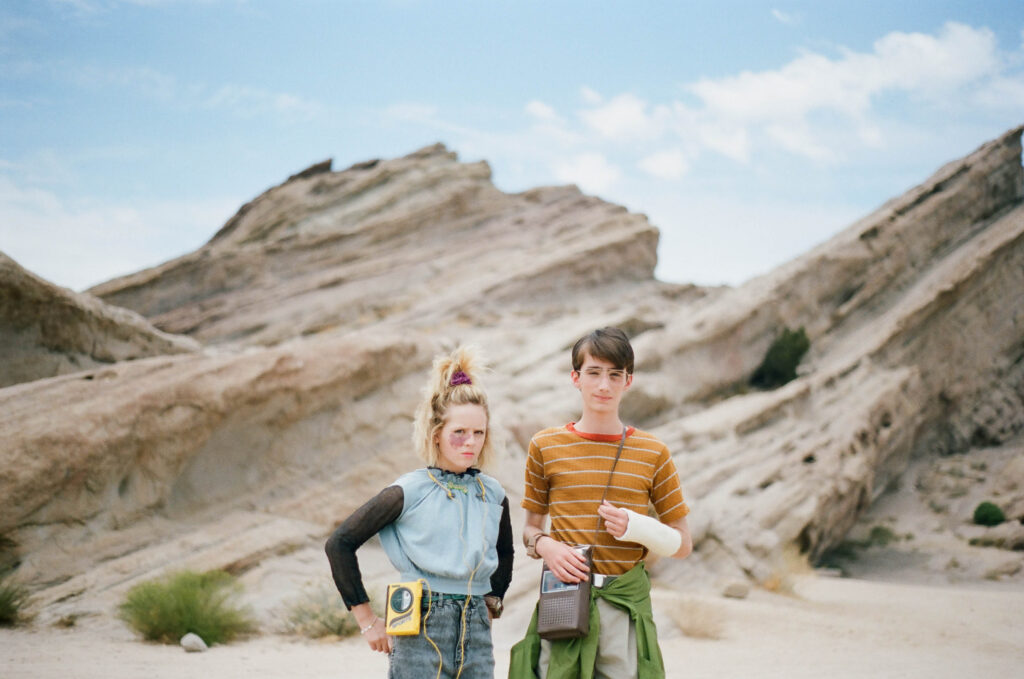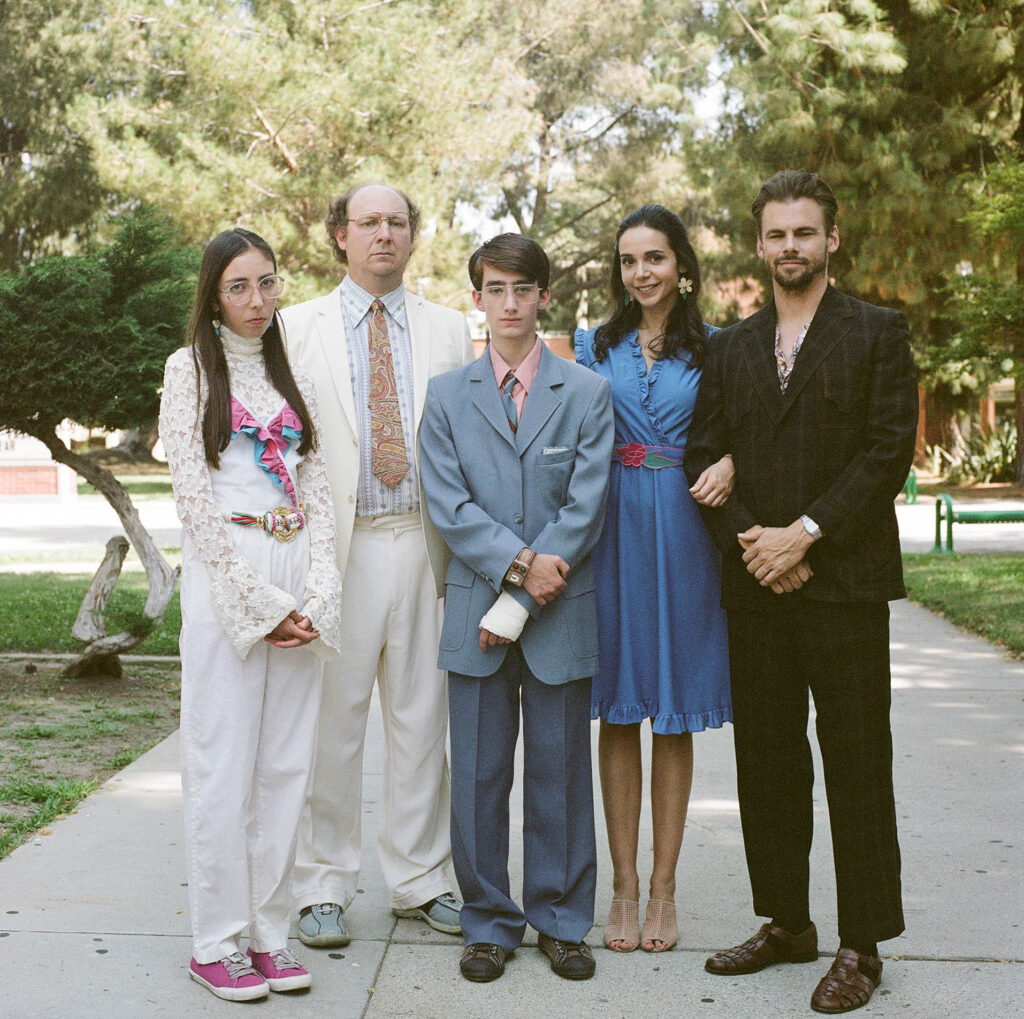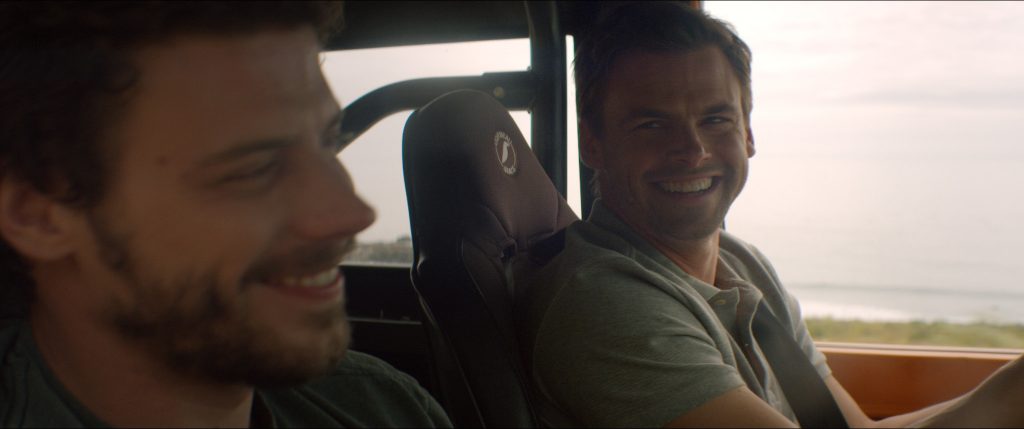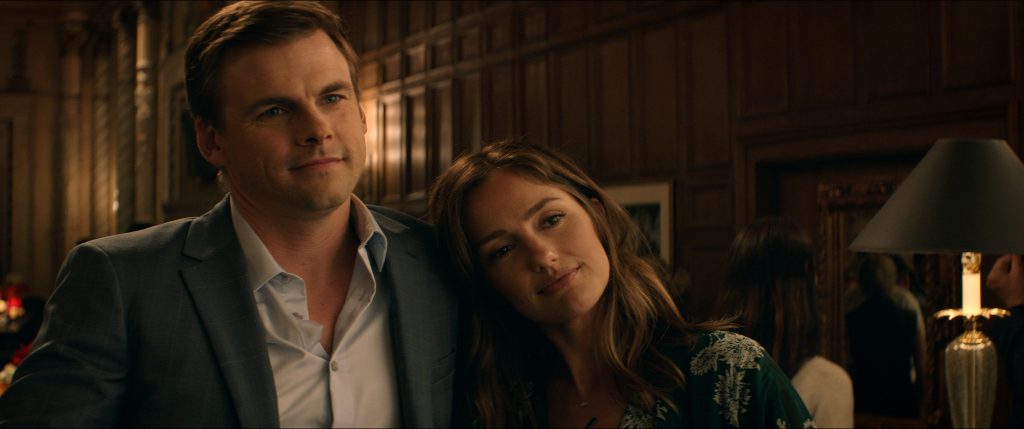January 15, 2023
by Carla Hay

Directed by Christopher Winterbauer
Culture Representation: Taking place in an unnamed U.S. city in the mid-1990s, the comedy film “Wyrm” features a predominantly white cast of characters (with a few African Americans, Latinos and Asians) representing the working-class and middle-class.
Culture Clash: In an alternate reality where people have to wear electronic collars until they get their first romantic kiss, a nerdy freshman in high school tries to get rid of the stigma of being the only person in his school who’s still wearing this collar.
Culture Audience: “Wyrm” will appeal primarily to people are interested in watching quirky coming-of-age comedies.

Amid the overabundance of comedies about nerdy teenage guys who want to be more sexually experienced, “Wyrm” is memorable for its unique story and quirky characters. This movie doesn’t try to have broad appeal because it’s for people who are interested in low-budget, independent films about eccentrics. The comedy in “Wyrm” is also mixed with a touching story about grief and how people choose to remember the deceased.
“Wyrm” (pronounced “worm”) is the feature-film debut of writer/director Christopher Winterbauer, who based the movie on his 2017 short film “Wyrm.” The feature film “Wyrm” (which takes place in an unnamed U.S. city) had its world premiere at the 2019 edition of Fantastic Fest in Austin, Texas, but the movie wasn’t released until 2022. Most of the comedy is deadpan and almost satirical, so don’t expect the typical formula of teen comedies where a geeky male outcast is trying to date his “dream girl.”
According to the “Wyrm” production notes, the movie is set in an “alternate reality” in the mid-1990s. It’s a reality where people’s sexuality is monitored in terms of levels. To reach Level One sexuality, someone must experience a romantic kiss. People have to wear an electronic collar that can’t come off until they reach Level One sexuality.
Wyrm Whitner (played by Theo Taplitz), who’s about 14 years old, is a freshman in high school with his twin sister Myrcella (played by Azure Brandi), who has a prickly relationship with Wyrm. Wyrm and Myrcella had an older brother named Dylan (played by Lukas Gage, shown briefly in flashbacks), who died in a car accident when Dylan was about 16 or 17. Dylan has been dead for less than a year.
Wyrm and Myrcella’s parents are emotionally absent. Their father Allen (played by Dan Bakkedahl) spends most of his time either at work or in the parents’ bedroom. Wyrm’s mother Margie (played by Rosemarie DeWitt) is on a trail hiking trip for an undetermined period of time. (Paula Pell has a cameo as a park ranger named Tanya.) Although there isn’t much information about the Whitner family dynamics before Dylan died, it’s implied that these parents are avoiding spending time with Wyrm and Myrcella because it’s the parents’ way of grieving.
For now, Myrcella and Wyrm are essentially being raised by their bachelor uncle Chet (played by Tommy Dewey), who met his current girlfriend Flor (played by Natalia Abelleyra) in an Internet chat room. In an early scene in the movie, Chet tells Wyrm: “I just think with the right girlfriend, you’d really be happy.” Chet also paints a portrait of Wyrm.
Wyrm has become preoccupied with interviewing people on his portable tape recorder about their memories of Dylan and about their thoughts on romantic relationships. Experiencing his first romantic kiss (preferably from his first girlfriend) soon becomes another preoccupation for Wyrm. He’s getting pressure to have his collar “popped” (unlocked) for various reasons.
When Wyrm and Myrcella entered high school, they both had Level One sexuality collars. However, Myrcella has recently had her collar “popped” because she’s been dating a Norwegian immigrant student at the school named Mads Nillson (played by Ky Baldwin), who was Myrcella’s first romantic kiss. Wyrm is now the only person at the school who has a Level One sexuality collar.
An early scene in “Wyrm” shows what type of comedy that the movie has about teen sexuality. Wyrm’s friend/classmate Charley (played by Samuel Faraci) tells Wyrm: “Mads Nillson fingered your sister at the cinema yesterday.” Charley then asks Wyrm if Wyrm feels the same things at the same time as Marcella does because they’re twins. Wyrm says about twin telepathy, “I think that’s only [with] identical twins.”
Wyrm and Myrcella, who share the same room, soon clash over how her level of sexual experience will now affect their living situation. Myrcella reads to Wyrm a formal declaration of why she wants to move into Dylan’s former room so that she can have more privacy. Wyrm thinks it’s disrespectful and too soon for anyone else to have Dylan’s former room.
However, Wyrm tells Myrcella that if Mads comes over to visit: “I don’t want Mads Nillson fingering anyone in my room.” Myrcella replies, “I don’t want to be related to the only freak in ninth grade who can’t get his collar popped.”
Wyrm’s level of sexual experience will also affect whether or not he can graduate from ninth grade. He’s called into a meeting with his school’s child development specialist Reginald “Reggie” Corona (played by Davey Johnson), who tells Wyrm: “You are literally the last incoming freshman to complete their Level One sexuality requirement. We’re collecting collars on Picture Day.”
Wyrm asks for an extension on when he can get his collar popped. Reggie agrees to the extension but cautions that time will soon run out for Wyrm. Reggie advises Wyrm to play on people’s sympathy to find a girlfriend: “A death in the family should work in your favor.” Wyrm gets even more pressure from the school’s vice-principal Cynthia Lister (played by Natasha Rothwell), who has a separate meeting with Wyrm in her office and ominously says to him: “Lonely people are dangerous, especially lonely boys.”
Wyrm doesn’t get any sex education from his parents, who avoid talking to him about it. There’s an intentionally amusing scene were Wyrm asks his parents: “How do kiss a person? And how do you finger them?” Each parent tells Wyrm to ask the other parent. Myrcella, now feeling sexually superior to Wyrm, wants to distance herself from him and treats him like an outcast at school.
Teen movie cliché alert: A student has recently transferred to the school from Florida. Her name is Izzy (played by Lulu Wilson), who is a sassy non-conformist. Wyrm is immediately attracted to Izzy, and wants to date her, but there’s a problem: Izzy has a boyfriend named Kyle, who’s in Florida, and Izzy wants to stay loyal to Kyle. Izzy doesn’t care about Wyrm being an unpopular student and school, because she’s not part of the popular crowd either, not does she want to be part of the crowd.
Thus begins the “will they or won’t they get together” part of the Wyrm/Izzy relationship. Along the way, Wyrm spends time with two other teenage girls who give him more insight into male/female relationships. Lindsey (played by Sosie Bacon) is a 17-year-old sarcastic student, who uses a wheelchair and who knew Dylan very well. Wyrm’s friend Charley introduces Wyrm to his sister Becky (played by Cece Abbey), who’s about 15 or 16, and is kind-hearted and appreciates Wyrm’s quirkiness.
“Wyrm” has some familiar story arcs found in many teen comedies, but they’re slightly off-center enough to avoid being completely predictable. The Level One sexuality collar is a symbol of the pressure that is put on teens to have certain sexual experiences by they time they’re a certain age. Whether or not people agree with this pressure, it exists, and those who are deemed sexually inexperienced are often unfairly labeled as social failures.
“Wyrm” doesn’t pass judgment on its title character, nor does it assign blame to any particular person for why Wyrm desperately tries to get his first romantic kiss, or risk getting the stigma of “being left behind.” Instead, the movie’s “alternate reality” is used as a mirror to show people how much it reflects what many teens experience in real life to a different degree.
The movie also has a meaningful depiction of how people cope with death and how their memories of someone who’s deceased can be altered for various reasons. The interviews that Wyrm conducts about Dylan are ostensibly so that Wyrm can make a tribute to Dylan. But as time goes on, viewers can see that these Wyrm is using these interviews to deal with his grief and to get to know Dylan better, since Wyrm and Dylan weren’t very close to each other.
As social misfit Wyrm, Taplitz gives a commendable performance that solidly carries most of the emotional wright in the movie. The rest of the cast members are perfectly fine, but the movie lives or dies on whether or not viewers will be interested in Wyrm. Some of the movie tries too hard to be offbeat, but there are enough moments of genuine humanity that can make “Wyrm” resonate with viewers who might not have much in common with the characters.
Vertical Entertainment released “Wyrm” in select U.S. cinemas, on digital and VOD on June 10, 2022.


